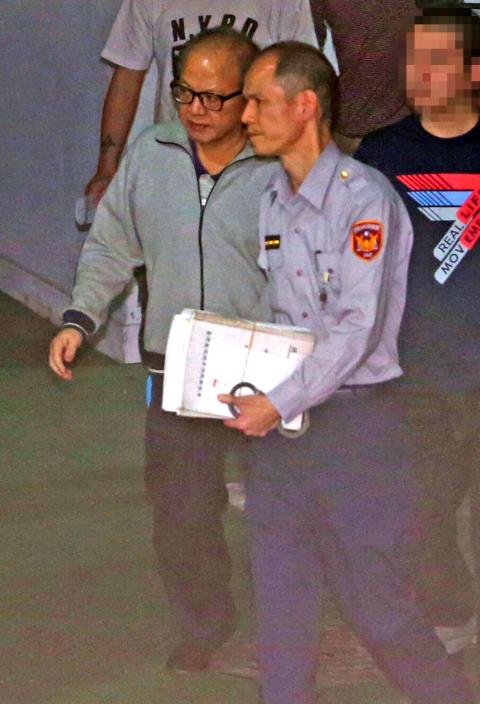Former Legislative Yuan secretary-general Lin Hsi-shan (林錫山) and 12 others were yesterday indicted for alleged irregularities in the procurement of computers for the legislature over a six-year period.
After a nearly four-month investigation, the Taipei District Prosecutors’ Office said Lin received NT$39.5 million (US$1.22 million) in kickbacks for helping Farnet Technologies Co secure contracts for the supply of computers.
Farnet won 33 contacts from the legislature between 2011 and last year, and it was usually the lone bidder, prosecutors said.

Photo: Chen Chih-chu, Taipei Times
Also indicted were Lin’s wife, Liu Hsin-wei (劉馨蔚); Chen Lu-sheng (陳露生), a former section chief at the legislature’s Information Technology Office; Farnet Technologies chairman Lee Pao-cheng (李保承); six legislative staffers and four Farnet employees.
The investigation was launched after prosecutors received a tip in 2013 alleging that Lin had been taking kickbacks from the company.
Lin was legislative secretary-general from February 1999 to Jan. 31 this year, the day before a new legislature was seated.
He had represented Changhua County as a legislator from 1990 to 1999, before former legislative speaker Wang Jin-pyng (王金平) tapped him for the position.

A magnitude 4.9 earthquake struck off Tainan at 11:47am today, the Central Weather Administration (CWA) said. The hypocenter was 32.3km northeast of Tainan City Hall at a depth of 7.3km, CWA data showed. The intensity of the quake, which gauges the actual effect of a seismic event, measured 4 in Tainan and Chiayi County on Taiwan's seven-tier intensity scale, the data showed. The quake had an intensity of 3 in Chiayi City and County, and Yunlin County, while it was measured as 2 in Kaohsiung, Nantou County, Changhua County, Taitung County and offshore Penghu County, the data showed. There were no immediate reports of

‘DENIAL DEFENSE’: The US would increase its military presence with uncrewed ships, and submarines, while boosting defense in the Indo-Pacific, a Pete Hegseth memo said The US is reorienting its military strategy to focus primarily on deterring a potential Chinese invasion of Taiwan, a memo signed by US Secretary of Defense Pete Hegseth showed. The memo also called on Taiwan to increase its defense spending. The document, known as the “Interim National Defense Strategic Guidance,” was distributed this month and detailed the national defense plans of US President Donald Trump’s administration, an article in the Washington Post said on Saturday. It outlines how the US can prepare for a potential war with China and defend itself from threats in the “near abroad,” including Greenland and the Panama

The Chinese Nationalist Party (KMT) is maintaining close ties with Beijing, the Democratic Progressive Party (DPP) said yesterday, hours after a new round of Chinese military drills in the Taiwan Strait began. Political parties in a democracy have a responsibility to be loyal to the nation and defend its sovereignty, DPP spokesman Justin Wu (吳崢) told a news conference in Taipei. His comments came hours after Beijing announced via Chinese state media that the Chinese People’s Liberation Army’s Eastern Theater Command was holding large-scale drills simulating a multi-pronged attack on Taiwan. Contrary to the KMT’s claims that it is staunchly anti-communist, KMT Deputy

RESPONSE: The government would investigate incidents of Taiwanese entertainers in China promoting CCP propaganda online in contravention of the law, the source said Taiwanese entertainers living in China who are found to have contravened cross-strait regulations or collaborated with the Chinese Communist Party (CCP) could be subject to fines, a source said on Sunday. Several Taiwanese entertainers have posted on the social media platform Sina Weibo saying that Taiwan “must be returned” to China, and sharing news articles from Chinese state media. In response, the Mainland Affairs Council (MAC) has asked the Ministry of Culture to investigate whether the entertainers had contravened any laws, and asked for them to be questioned upon their return to Taiwan, an official familiar with the matter said. To curb repeated